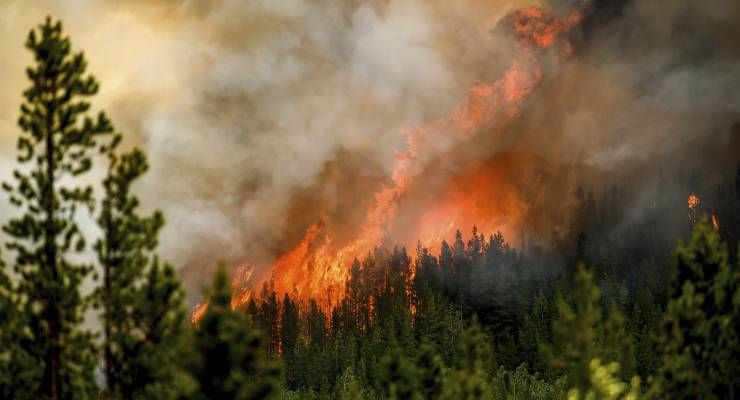
Some 1036 mostly out-of-control wildfires are incinerating old-growth forests, native animals, homes and businesses across Canada as the Great White North battles its worst inferno, but Canadians aren’t hearing a scrap of news about it on Facebook or Instagram.
On August 1, Meta banned all Canadian news from its two largest social media platforms in retaliation for Prime Minister Justin Trudeau’s progressive Liberal government’s Online News Act — the new law forces big digital players to pay news publishers for their content.
It’s the same retaliation we saw in Australia in 2021 when the Morrison government’s news media bargaining code spurred Meta to launch what would end up being an eight-day news blackout, says Curtin University Professor Tama Leaver.
Major news outlets such as the ABC, The Sydney Morning Herald and news.com.au disappeared off newsfeeds, but the clumsy blackout also blocked the Facebook pages of emergency services when Western Australia was in “the grip of bushfires and grappling with the pandemic”, Leaver, an expert in online communication and media, tells Crikey.
The blackout lifted after Facebook boss Mark Zuckerberg and then-treasurer Josh Frydenberg emerged from eleventh-hour negotiations, both claiming victory about a watered-down code. But Leaver, who is also the president of the Association of Internet Researchers, points out Canada’s news ban has gone on three times as long — and counting.
“While emergency services websites and, indeed, news websites in Canada are still there, the path to them will be less direct for many people who’ve relied on family and friends curating news for them, effectively, via the Instagram or Facebook feeds,” he warns.
“There is a real chance that the lack of news on Meta’s platforms could endanger lives in an emergency in Canada.”
Like the ABC during the Black Summer crisis, Canada’s Broadcasting Corporation (CBC) has been a lifeline for citizens during the fires (including more than 630 First Nations communities) with more than 15.3 million hectares destroyed so far. It’s more than double Canada’s previous record of 7.1 million hectares blackened in 1995, and the equivalent of about three-quarters of Victoria going up in flames.
The broadcaster has become particularly important as fire-engulfed communities in the hardest-hit west report “a lack of communication” from authorities, in one case leaving them feeling “abandoned” as they entered day five battling a blaze.
It could be an ominous sign of things to come in Australia. Earlier this month the ABC shut down nearly all its accounts on X, formerly known as Twitter, amid the torrid leadership of the world’s richest man, Elon Musk. It means its social media reach in emergencies just got that much narrower, Leaver says, at the inopportune moment that Australia stares down its worst bushfire season in years and more probable climate calamities on the horizon.
What’s worse, concessions in our news media bargaining code left the government with a trigger — before a social media platform is subjected to the code, the treasurer must first consider whether it has reached commercial agreements with news media businesses. Should the treasurer do so anyway, Facebook and Instagram could just ban all Australian news again, leaving the government hamstrung by Meta.
But Trudeau’s government is playing hardball in a way that the Australian government did not. Meta issued a terse statement to CBC last week reinforcing it would not budge (although it had active a safety check function so people could mark themselves safe).
On Monday morning, the typically demure Trudeau was furious that Meta was digging its heels in an unprecedented emergency situation “where up-to-date local information is more important than ever”.
“It is so inconceivable that a company like Facebook is choosing to put corporate profits ahead of ensuring that local news organisations can get up-to-date information to Canadians and reach them where Canadians spend a lot of their time — online, on social media, on Facebook,” he said.
As the government and Meta look set to continue their standoff, it’s Canadians battling deadly blazes who could end up paying the ultimate price, Leaver says: “As it was in Australia, it’s the average user stuck in the middle who is getting a raw deal.”








There is a herd of rather large elephants rampaging throughout this article. First a disclaimer: I am neither a user, nor a supporter of, Facebook or any of Meta’s other products. Its users coming to their senses and choosing to resign from the platform(s) would bring a wide smile to my face.
Having said that, for an alternative view on the Canadian/Facebook stand-off I encourage you to turn your attention to the coverage of the issue on Techdirt (e.g. https://www.techdirt.com/2023/08/22/canadian-media-orgs-said-that-meta-linking-to-news-was-anticompetitive-now-they-say-not-linking-to-news-is-anticompetitive/).
The specifics of my objections to the slant of this article are as follows:
Sorry, but while I loathe Facebook for a multitude of reasons, not doing a Government’s job for it isn’t one of them.
Meta have pushed their products (Facebook, Instagram and now, Threads) to be THE source of information sharing – but if they want this, then they should also accept the responsibilities that come with it
but like most (all?) corporations they’re all about looking after themselves – while their customers, clients, employees and providers of free content can all burn in forest fire
I agree. They should. However, they don’t. They are a corporation. Their sole criterion for success is how much profit they made. It will never be and can never be “how many lives we saved”.
“How many lives we saved” should be a KPI for the Canadian government. Instead, they seem to think that forcing Facebook to throw money to legacy news publishers is more important than saving lives. Those legacy news publishers also appear to agree. Their loss of advertising revenue is a more important issue for them than their readers’ lives.
One would think that critical life endangering events would be broadcast on all types of services that the public use, it could save lives. , you know as an ethical corporate citizen.
Facebook has made itself a centralised information broadcasting system why wouldn’t it want to broadcasts emergency information during forest fires to help save Canadian lives? It can’t always be about money and the Canadian government is entitled to make laws that suits its citizens and if it wants to take Facebook on, good for them.
Since when? Facebook is a platform for targeting ads at users while the users share information (and famously misinformation) with each other. (Although mostly sharing their information with Facebook, of course…) Remember, Facebook is able to switch off links to new sites because being a source of news is not their role.
Also, this isn’t about Facebook broadcasting, or not, emergency information. This is about Facebook being charged to direct traffic to news articles on Canadian websites which may contain emergency information.
There may well be Canadians reading this very article. Nothing is stopping them from subscribing. Why then isn’t Crikey broadcasting emergency information for them?
The Guardian, Nine/Fairfax newspapers (by now it’s possible that even News Ltd might have grudgingly admitted the existence of the fires in a brief article). Why aren’t they all prominently displaying emergency information in an effort to save Canadian lives? Oh, wait – because that’s not their role.
One last point.
As the Techdirt post points out, this is a very stupid law which, if not fought, literally has the potential to break the World Wide Web. That is not hyperbole. The Web exists as text entries pointing to other text entries. The consequence of this law is that it has the potential to turn the Web into a dysfunctional mess of paywalls. For instance, I linked to a Techdirt post above. Should Crikey have to pay for me to be able to do that? How long before, were the law to become more widespread, everybody removes the ability to link to an external site because allowing us to do so costs them money?
Might the solution be for public broadcasters like the ABC and CBC to develop their
own social media services (as an international consortium?) to attract audiences? If they
dispensed with or tempered
algorithm-driven feeds they
could prove more attractive to users than the annoyingly-curated offerings of Meta. Even if it were a no-frills service, the absence of ads would surely be a winner. Of course it may require significant public funding, but if the yoof aren’t watching free-to-air…
I completely agree. As we are repeatedly seeing (as with the ex-Twitter meltdown) governments have not even bothered to contract out communication with their own citizens. When Twitter broke, the ABC just picked up a number of accounts and signed up with a new messaging service – no lesson learnt. The whole idea of just leaving an unprofitable task to the market to sort out and hope for corporate altruism is mind-bogglingly stupid!
Even more stupid is that were a government to actually contract out (i.e. for money, with contracts) the emergency broadcast system to Facebook they would probably get good value for their (our) money. The location of their citizens is the least of the information Facebook has to hand!
Why anyone of sane mind would ever think using social media as their primary news source was a good idea, baffles me.
AnusBook and X (and the rest) are NOT a reliable source of information. Public Broadcasters tend to cover emergencies very well, and offer wide coverage.
Good idea Canada – lock the goons out.
Facebook zucks
Zuck off Facebook
I know I am old and out of touch, but I cannot understand the link between Facebook and News. To catch up, should I cancel news and streaming subscriptions and only use Facebook? I know there are products that I was interested in buying, but did not follow up because they required Facebook to get any information. What was wrong with the old idea of websites?